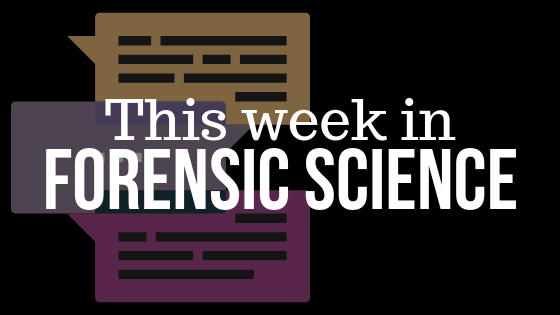No one has hours to scour the papers to keep up with the latest news, so we’ve curated the top news stories in the field of Forensic Science for this week. Here’s what you need to know to get out the door!
Genetic Genealogy Links Former Marine to Young Woman’s Murder in 1976: Sheriff (ABC News – 5/31/2019)
DNA and genetic genealogy have linked a former Marine to the murder of a young California woman who was strangled to death in 1976, according to authorities.
New Rapid DNA Testing Helped Police Find Lizzy Shelley (ABC 4 – 5/31/2019)
- Where traditional DNA testing can take days or even months, Rapid DNA takes about 90 minutes. Because prosecutors had strong evidence, police were able to charge Alex Whipple even before finding Lizzy’s body, then trade a life-sentence for Whipple’s confession and her location.
Texas Lawmakers Pass Bill that Will Expand DNA Database (KBTX TV3 – 5/31/2019)
Texas lawmakers have passed a bill that will allow DNA samples to be taken during felony arrests. That sample will then be put in a national DNA database and run against existing unsolved crimes.
Arrest in 43-Year-Old Murder Case Stuns Wisconsin Town (ABC News – 6/1/2019)
The widower and father of five grown children had lived quietly for two decades among the 800 residents of Lakewood, a northern Wisconsin town surrounded by forests and small lakes.
Now authorities were saying this man was a cold-blooded killer. They had used genetic genealogy to crack a cold case that stretched back well into the 20th century — a double murder 25 miles southwest of Lakewood.
Ancient Fingerprints and Forensic Science Challenge Ideas about ‘Women’s Work’ in Ancestral Puebloan Society (ABC.net – 6/3/2019)
This discovery, reported in the Proceedings of the National Academy of Science, uncovered physical evidence to show both males and females were involved in pottery production in a village of Ancestral Puebloans.
Until now, there had been an understanding that the production of household pottery was almost exclusively done by women in the ancient Native American communities of the south-west United States.
Networks of Sponges Could Capture DNA to Track Ocean Health (Science Magazine – 6/3/2019)
To track the biological health of oceans, researchers use cameras, satellite images, and, increasingly, DNA shed directly into the water. But capturing genetic material in the sea is a tough task: Scientists must sift through massive amounts of water to dredge up their samples. Now, marine biologists have discovered that sponges are very good at “sponging” up DNA. More research is needed, but eventually a network of sponges planted throughout the oceans could provide an easy readout of how the diversity of plants and animals nearby is doing.
First Criminal Conviction Secured with Next-Gen Forensic DNA Technology (Business Wire – 6/4/2019)
Verogen announced today that its DNA sequencing technology played a pivotal role in a recent court case in the Netherlands. This marks the first time that evidence generated with so-called “next generation” or massively parallel sequencing (MPS) has been used to secure a conviction in criminal courts of law.
Texas Governor Signs Bill Targeting Rape Kit Backlog (Forensic Magazine – 6/5/2019)
The Texas measure mandates law enforcement agencies conduct an audit to determine the number, status, and location of all of the untested rape kits in the state and then set timelines to ensure they are analyzed. It also allocates roughly $50 million toward hiring more workers at the state’s crime labs and expands access to sexual assault nurse examiners for underserved populations.
DNA Mixture Sorts Out Triple-Homicide Conviction in Florida (Forensic Magazine – 6/5/2019)
A man who was convicted of the murder of a bar owner and two nightclub dancers in 1994 spent 16 years on death row. Appeals, crowdfunding and intense public interest from Europe all paved the way for a third trial for Pablo Ibar earlier this year.
10 Years Later, Independence Should be the Future of Forensics (Forensic Magazine – 6/6/2019)
Independent, unbiased and competent forensic services are the best way to improve the entire justice system, as recommended 10 years ago by the National Academy of Sciences in its report, Strengthening Forensic Science in the United States: A Path Forward. It is now time for more cities and states to follow Houston’s lead and move in this direction.
A New Way to Solve a Murder, Part 1: The Genetic Detectives (New York Times – 6/6/2019)
Genealogy websites have led to major breakthroughs in decades-old cold cases. But the revelations may come at a price.
WOULD YOU LIKE TO SEE MORE ARTICLES LIKE THIS? SUBSCRIBE TO THE ISHI BLOG BELOW!


